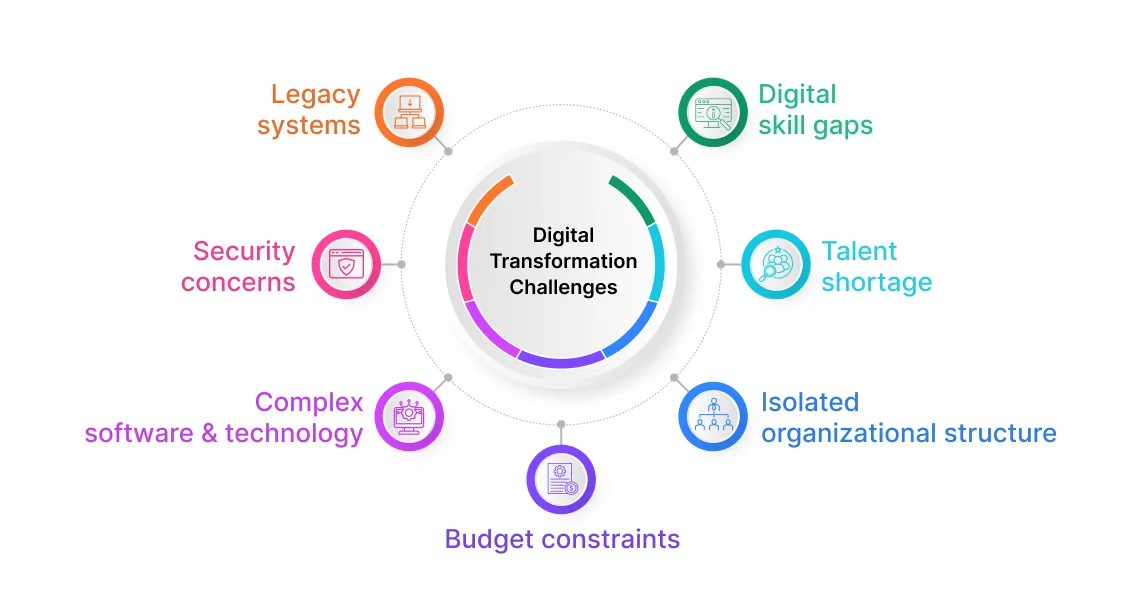10 Challenges in Digital Transformation and How to Overcome Them
- Business
- January 30, 2024
In today’s fast-paced digital landscape, staying ahead requires more than just keeping up; it demands leading the pack. Digital transformation emerges as the key strategy to thrive in the digital age. With offering benefits in manifolds, there are many digital transformation challenges you can expect to face. Read this blog to know the challenges in the digital transformation journey and effective ways to mitigate those for better outcomes.
When thinking of staying ahead of the curve, it’s not just about keeping up; it’s about leading the pack. Today, given the scenario of technological advancements, it’s digital transformation that can ensure your business is not just surviving but thriving in the digital age.
It’s not just a trend; it’s a game-changer!
For the CTOs and CXOs seeking the number to take the decisions, here are some statistics that would provide you with a better idea of what the future holds.
A report by Research and Markets shows digital transformation market size is predicted to grow from USD 695.5 billion in 2023 to USD 3,144.9 billion by 2030, at a Compound Annual Growth Rate (CAGR) of 24.1% during the forecast period.According to a report by Statista Research Department, global digital transformation spending is forecast to reach 3.4 trillion U.S. dollars by 2026.

Though the organizations realize its importance, they are intimidated by implementing it. The implementation of digital transformation is not a straight road. An organization with ambitious and tech-savvy stakeholders may face challenges.
But before jumping right into these digital transformation challenges and finding a way out, let us first understand the fundamentals of digital transformation.
What is Digital Transformation?
Apart from adopting digital tools, innovative software, technologies, and data to enhance business processes, digital transformation is also about reimagining business models, workflows, and more such innovative ways(conventional business processes like automation). In a nutshell, it encompasses a cultural shift and a strategic approach to utilizing digital capabilities for innovation and efficiency.
Implementing digital transformation leads to the following:
- Improved customer experience
- Enhanced collaboration
- Data-driven decision making
- Easy scalability
- Streamlined operations
Now explore the following challenges that our organization or business may face when not leveraging digital transformation service and implementing it on their own.
Key Challenges in Digital Transformation
While the promise of enhanced efficiency and innovation is alluring, the path is not without its challenges. From adapting to new technologies to overcoming resistance to change, the digital transformation implementation has hurdles that demand attention.

Here are some of the major challenges in digital transformation which your organization/business may face:
1. Legacy systems
Regardless of the availability of sophisticated, high-tech, efficient digital solutions, enterprises do not seem to get over their legacy systems. This older technology infrastructure has faithfully served these enterprises over the years.
These systems are characterized by aging software and hardware, inherent rigidity, and incompatibility with contemporary software, making it complex and resource-intensive for businesses to adapt and innovate.
2. Security concerns
The challenge extends beyond traditional cybersecurity measures, for issues like data breaches, unauthorized access, and the ever-present risk of cyber threats. The organizations struggle to strike a balance between innovation and protecting against evolving security threats.
3. Complex software and technology
Unlike the old tech infrastructure, the integration of advanced technological solutions into existing frameworks often demands meticulous planning and execution. This involves navigating through intricate software specifications and adapting to evolving technological landscapes.
Challenges in implementing digital transformation arise as organizations strive to align their operations with the digital age, harnessing the power of innovative software and cutting-edge technologies.
4. Lack of a digital transformation strategy
It’s like embarking on a cross-country trip without a map – you may have the vehicle (technology) but without a clear direction, reaching the desired destination becomes uncertain. Without a well-defined roadmap, businesses may find themselves navigating the complexities of digital transformation without a clear direction.
The absence of a robust strategy means that crucial aspects like technology adoption and process optimization may lack coordination. This lack of a digital transformation strategy can result in inefficiencies, missed opportunities, and a confusing approach to technological advancements.
5. Budget constraints
The implementation of digital transformation initiatives demands a strategic allocation of financial resources, encompassing the procurement of cutting-edge technologies, employee training, and infrastructure enhancements.
These budget constraints pose a significant hurdle, restricting the allocation of funds for the acquisition of essential tools and the execution of comprehensive transformation initiatives.
6. Isolated organizational structure
In this scenario, each department functions independently, often unaware of the activities and goals of others. These isolated structures foster an environment where crucial insights, innovations, and resources are confined within specific departments, preventing the organization from fully leveraging its collective potential.
When departments operate in isolation, it hinders collaboration and communication across the board. This can restrict the smooth flow of information, leading to missed opportunities and inefficiencies.
7. Lack of resource availability
Essential resources like skilled executives, technological infrastructure, and financial investments are required for a successful digital transformation journey. The shortage of skilled professionals with expertise in emerging technologies, coupled with budget constraints, can hinder the adoption of transformative digital initiatives.
8. Digital skill gaps
The skill gap is a result of a lack of proficiency in using advanced software to understand complex data analytics tools.
The demand for specific digital competencies, such as data analytics, cybersecurity, and proficiency with advanced technologies, often outpaces the rate at which employees can acquire these skills.
9. Complex regulatory frameworks
Increasingly complex regulatory frameworks are significant limitations that organizations face. As technology evolves, so do the regulations that govern it, creating a dynamic environment that demands constant adaptation.
The specifications within these regulations add layers of complexity to the implementation of digital transformation strategies. From data privacy concerns to compliance requirements, businesses must consider regulatory compliance to ensure that their digital strategies align with legal standards.
10. Inefficient data management and scalability
When using the legacy technical infrastructure or systems organizations often struggle to handle and organize their growing data volumes with time and business growth. It results when outdated systems are incapable of efficiently processing the growing datasets or a lack of standardized processes. This challenge becomes a bottleneck in the smooth integration of digital solutions.
One of the major after-effects of it is inadequate scalability. When systems cannot seamlessly grow or handle increased workloads, businesses encounter roadblocks in their digital transformation journey. Inadequate scalability further raises issues like systems struggling to handle a surge in data volume, increased user traffic, or the inability to adapt swiftly to evolving technological requirements.
Solutions for Overcoming Digital Transformation Challenge
Understanding and addressing these digital transformation challenges become the key to unlocking the full potential of a successful digital transformation. Here are some solutions that you can consider for smoother digital transformation:
Craft a solid implementation plan
A well-thought-out strategy ensures a smoother transition and successful integration of new solutions. Having a plan helps business owners outline the specific steps, timelines, and resources needed for the transformation process. This includes clearly defined goals, allocation of responsibilities, and a realistic assessment of potential risks. An organized approach helps business owners navigate the complexities of digital transformation implementation with efficiency.
Align your digital transformation programs with business outcomes
Aligning your digital transformation strategies with business outcomes ensures that the technology initiatives implemented resonate with business goals. It not only maximizes the impact of your transformation efforts but also helps the organizations streamline their efforts and derive tangible value from their digital transformation.
Strategize technology procurement plans
With digital transformation comes the anticipation of a seamless integration of the latest technologies(hardware specifications, software integrations, and scalability).
Consider outlining clear technology specifications, evaluating compatibility with existing systems, and assessing scalability. This proactive approach not only addresses the challenges but also sets the stage for smooth future-ready digital transformation.
Hire a digital transformation consultant
The digital transformation journey can be a daunting task for any business. Navigating the complexities of evolving technologies to shifting paradigms requires a strategic approach.
By hiring a digital transformation consultant, you gain expert insights equipped with the knowledge and experience to streamline your transformation process. These consultants bring a specialized skill set, offering tailored strategies to address your unique challenges.
Whether it’s optimizing workflows, adopting new technologies, or fostering a digital-first culture, the expert team at MindInventory is here to ensure a smooth and successful transformation for your business.
Implement custom digital transformation solutions
Businesses often encounter unique challenges that demand tailored solutions. One-size-fits-all approach may not suffice in the complex realm of digital transformation. The best approach towards it is to implement bespoke digital transformation strategies and solutions crafted to address the specific business needs and complexities of your organization.
These solutions go beyond generic strategies, incorporating specifications that are finely tuned to optimize your digital transformation journey.
Enhance your cybersecurity strategy
As technology advances, so do the security risks!
To ensure the security of sensitive data, customer trust, and overall business continuity, having a robust cybersecurity strategy in place is a must. It will not only address vulnerabilities but also enable the business to stay ahead of cyber threats, so the businesses can lay a resilient and secure foundation for their digital transformation.
Monitor and adapt continuously
Digital transformation is not a one-time fix but an ongoing process that requires agility and responsiveness!
From analyzing performance metrics, and swiftly adjusting strategies to align with emerging trends in digital transformation. Apart from this, the business also has to monitor industry shifts, technological advancements, and customer expectations for adjusting strategies in real-time necessary for navigating the complexities of digital transformation.
Doing so would enable business owners to identify bottlenecks, seize new opportunities, and ensure that their transformation efforts align with the ever-changing demands of the industry.

Overcome Digital Transformation Challenges With MindInventory
At MindInventory, we’re your strategic partner in unlocking the full potential of your digital transformation. What sets us apart is our holistic approach to digital transformation. We have a knack for providing digital transformation services like digital assessment, innovation, full-cycle product development, digital marketing, and more.
We understand that each business is unique, and so are its challenges. With MindInventory, you’re not just getting services; you’re getting a tailored solution that aligns perfectly with your goals. Our dedicated team brings in a wealth of experience, a passion for innovation, and a dedication to excellence.
The team of experts at MindInventory collaborates closely with you to gain deep insights into your operations, goals, and aspirations. This personalized approach enables us to design and implement digital transformation strategies that not only address your current challenges but also propel your business toward sustained growth. Reach out to us today, and let’s embark on a journey of innovation and success together.













